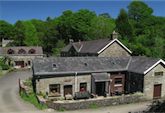Where have all the vowels gone? And what are the double Ds all about, is it a road sign or an advert for the nearest lingerie shop? Speaking Welsh is easier than it looks – if how it looks isn’t enough to put you off forever. On first glance the sentences seem to be overpopulated with letters rarely used in English – thousands of Ys jostle for space alongside other consonants, and nothing seems pronounceable.
In fact, the letter Y is a vowel. As is W. The Welsh language does make use of the ”˜normal’ vowels AEIOU but in Welsh they have a few extra friends. Additional consonants include double DD (sounds like TH), RH (roll roll roll your Rs gently down the tongue!), CH (like clearing your sore throat), NG (sounds like a Welsh version of ugh!), FF(a normal F) and PH. Not forgetting the infamous culprit of many a tongue-twisting village name – the double LL (hiss!)
There is no J. (Only occasionally used for words like garej (garage) and other words incorporated into the language for which there are no sounds).
The beauty of the Welsh language is that it is phonetic. Once you have learnt the sounds of the alphabet it is easy to pronounce anything. Unlike English there are no quirky spelling rules or pronunciation trip wires like Leicester, Salisbury or Carlisle. There are no silent letters. In Welsh you will quickly be able to read road signs out loud and be understood when asking for directions – if you only learn the alphabet and apply an exaggerated Welsh accent for emphasis. (Except for the occasional Y, which changes its pronunciation depending on its position).
As with all languages, Welsh has a sneaky grammatical challenge thrown in to exasperate language learners. The dreaded mutations. A word’s first letter will change depending on what is being ”˜done’ to it. For example a cat or cath may change to gath or ngath depending the quantity, who it belongs to, simply dependent on the word in front of it. However, if you are only beginning to learn Welsh, you needn’t worry about these yet, but may notice signs to Caerdydd (Cardiff) may sometimes be to Nghaerdydd.
There is a lot of bad press about Welsh speakers in Wales continuing to speak Welsh to ostracise English visitors. Personally all I have ever encountered is admiration for having learnt some of their ancient language and encouragement to learn more. There are few places left in Wales where Welsh is spoken as the default language so learners can often find it hard to find somewhere to practice. With only 20% of the population able to speak Welsh, many fear that the language will one day die out. Learn how to speak Welsh while you can.
Welsh Spoken
We speak Welsh at Swansea Valley Holiday Cottages so do feel free to practice during your stay! If you see the symbol above during your holiday in Wales, it means “Welsh Spoken Here”.
